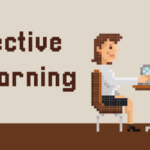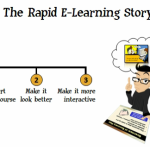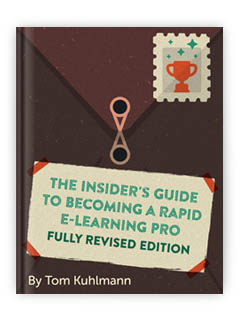I’ve been part of this industry for years. I found that you have to keep learning and be willing to change. I think my question is what can a person do to gain new skills? It’s easy to post this stuff, but how do you really make it happen?

Have you been following our series, 5 Myths About Rapid E-learning? We’ve already covered a lot of ground.
- Myth 1: Rapid E-learning is Crapid E-learning!
- Myth 2: A Rapid E-learning is a Second-Class Product!
- Myth 3: A Rapid E-learning Tool in the Hands of a Subject Matter Expert is Not Good!
Let’s keep moving!
The world is changing and that’s not going to stop anytime soon. To remain competitive you need to change with the world around you. The trend with e-learning is towards rapid development because it meets a legitimate business need.
As more subject matter experts (SME) develop e-learning courses, they’ll look to your expertise. You might see your job shift from one of course developer to that of SME coach.
Although years ago when I was building PowerPoint slides for a living, I was worried that one day someone would realize how easy it was and I’d be out of work. This never happened. It’s possible that you’ll actually get more e-learning work than less.
I figure that as the tools are easier to use, that will spark more desire to build and deliver training information. Thus, the content owners like the SME will be pressed to share even more information, which might mean a greater need for rapid e-learning developers to lift the burden from the SME.
As the tools evolve, there will be less need for specialized skills like flash programming and more demand for people who can do end-to-end development. That means that if you are an instructional designer, you’ll need to broaden your skill set. You’ll need to know a little of everything: project management, performance consulting, marketing, communications, web technology, audio, video, graphics design, and so on.
The secret is to develop the skills now.
Quit complaining about the SME. Instead take the opportunity to broaden your skill set and become more valuable to your organization.
- Change the focus of what you do. Stay on top the training industry and become a resource to your organization. If you have subject matter experts who use rapid development tools help them do a better job using them. Look for ways to introduce people to the rapid development tools. Find the “go-to” experts in the organization. Help them save time and you’ll be a hero. The key is to use your expertise to empower others to do their jobs well. If you do this, you’ll always have a job.
- Leverage your community of users. One of the best resources for learning and enhancing your skills is to participate in community forums. There are forums for software users, as well as any of the other skills you need to develop. It is a great way to develop new skills, get help on projects, and network with your peers.
- Continue to learn. Make a list of the end-to-end skills you’ll need and then develop a plan to learn them. I like to look at what others do and see if I can replicate that. For example, when I want inspiration for the look of my course, I’ll go to a site like Template Monster. Reviewing their flash templates gives me ideas about interface design and color schemes. As a routine, I review award winning courses and find ways to incorporate what they did in my own work.
You cannot control this world, but you can control what you do. Become an expert who brings value to the organization or customers and you’ll always have a job.
In our final post, we’ll discuss the myth that your creativity is hindered by rapid elearning tools.
Events
- Everyday. Check out the weekly training webinars to learn more about Rise, Storyline, and instructional design.
Free E-Learning Resources
 |
 |
 |
|
Want to learn more? Check out these articles and free resources in the community. |
Here’s a great job board for e-learning, instructional design, and training jobs |
Participate in the weekly e-learning challenges to sharpen your skills |
 |
 |
 |
|
Get your free PowerPoint templates and free graphics & stock images. |
Lots of cool e-learning examples to check out and find inspiration. |
Getting Started? This e-learning 101 series and the free e-books will help. |
11 responses to “Myth 4: Since Anybody Can Now Build Training, I Am Going To Lose My Job!”
There needs to be some balance to this. SMEs need access to the tools. We just don’t want them throwing a bunch of courses together. Most of them aren’t trained on instructional design and tend to build courses that look like the worst in powerpoint.
Hi All
I have been working as an Instructional designer for hardcore technical companies for the last 3 years. I have worked with all types of SMEs and have realized that the primary job of a SME is a specific task and coureware development is not that task. They may setup networks, troubleshoot products, and do many other wonderful things but ask them to write 20 pages of content using even the simplest of tools they will give up. Its just not intersting. What works is that we give some some nicely written material which they review and comment on. We fix it and use nice softwares such as Articulate and Engage to publish it. Otherwise, they create a course that is technically tremendous but language wise its bad. We clean that up add nice scenarios and examples and get it done. So dont worry our jobs are safe. We have to constantly learn to keep pace with the industry but then thats the challange and i love it.
I love this concern!
Doesn’t it seem so intuitive that with the advent of new, easier-to-use technology, Gen Yers practically born with laptops, and the simultaneous increase in demand (and respect) for e-learning that cheaper and easier production modalities would be sought after? And if so, will instructional designers, like the computer programmers of the late nineties, eventually be viewed as well qualified, but overpaid and outmoded answers to the training production question?
Perhaps. However, no matter how easy a tool becomes to use, the craftsman utilizing the tool still creates the masterpiece. Sound instructional design is so much more than a set of tools on a belt. It is the sum of theory, client needs, and an understanding of the audience. Whether using PPTs or high end flash to convey a message, sound instructional design will remain an art form bought and sold in the economy of ideas and methodology–not tools.
[…] Myth 4: Since Anybody Can Now Build Training, I Am Going To Lose My Job! […]
Just because “anyone” can build training does not mean that they can develop e-Learning the right/acceptable way for customers. It still takes talent and skill to be able to apply the new applications to the old dog. With due diligence in remaining current and capable with the same programs available to “anyone,” you can increase your job security over the next guy and remain more marketable than newbies to this business. As stated in the text of this article, the secret is indeed in developing the skill now.
I want to learn more about creating elearning. Thanks!
In a few of your posts, you mention reviewing Award-Winning Courses. Can you direct me to some sites where I might find them?
[…] […]









0
comments